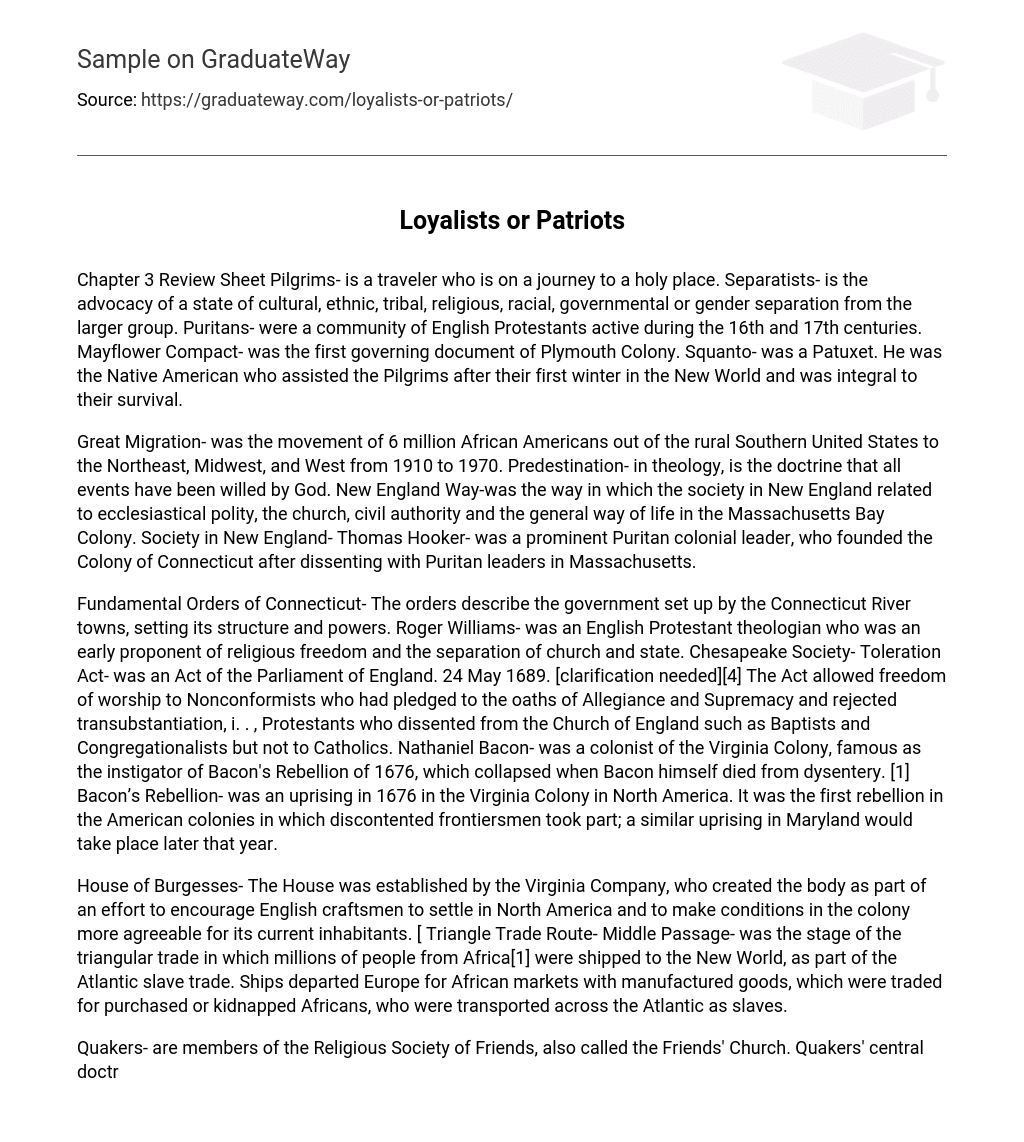- Sheet Pilgrims- is a traveler who is on a journey to a holy place.
- Separatists- is the advocacy of a state of cultural, ethnic, tribal, religious, racial, governmental or gender separation from the larger group.
- Puritans- were a community of English Protestants active during the 16th and 17th centuries.
- Mayflower Compact- was the first governing document of Plymouth Colony.
- Squanto- was a Patuxet. He was the Native American who assisted the Pilgrims after their first winter in the New World and was integral to their survival.
- Great Migration- was the movement of 6 million African Americans out of the rural Southern United States to the Northeast, Midwest, and West from 1910 to 1970.
- Predestination- in theology, is the doctrine that all events have been willed by God.
- New England Way-was the way in which the society in New England related to ecclesiastical polity, the church, civil authority and the general way of life in the Massachusetts Bay Colony.
- Society in New England- Thomas Hooker- was a prominent Puritan colonial leader, who founded the Colony of Connecticut after dissenting with Puritan leaders in Massachusetts.
- Fundamental Orders of Connecticut- The orders describe the government set up by the Connecticut River towns, setting its structure and powers.
- Roger Williams- was an English Protestant theologian who was an early proponent of religious freedom and the separation of church and state.
- Chesapeake Society- Toleration Act- was an Act of the Parliament of England. 24 May 1689.
- The Act allowed freedom of worship to Nonconformists who had pledged to the oaths of Allegiance and Supremacy and rejected transubstantiation, i. . , Protestants who dissented from the Church of England such as Baptists and Congregationalists but not to Catholics.
- Nathaniel Bacon- was a colonist of the Virginia Colony, famous as the instigator of Bacon’s Rebellion of 1676, which collapsed when Bacon himself died from dysentery.
- Bacon’s Rebellion- was an uprising in 1676 in the Virginia Colony in North America. It was the first rebellion in the American colonies in which discontented frontiersmen took part; a similar uprising in Maryland would take place later that year.
- House of Burgesses- The House was established by the Virginia Company, who created the body as part of an effort to encourage English craftsmen to settle in North America and to make conditions in the colony more agreeable for its current inhabitants.
- Triangle Trade Route- Middle Passage- was the stage of the triangular trade in which millions of people from Africa were shipped to the New World, as part of the Atlantic slave trade. Ships departed Europe for African markets with manufactured goods, which were traded for purchased or kidnapped Africans, who were transported across the Atlantic as slaves.
- Quakers- are members of the Religious Society of Friends, also called the Friends’ Church. Quakers’ central doctrine is the priesthood of all believers.
- Abolitionists- a movement to end slavery, whether formal or informal.
- Task system- is a reference within slavery to a division of labor established on the plantation. Restoration-in reference to the year 1660 refers to the restoration of Charles II to his realms across the British Empire at that time.
- Peter Stuyvesant- served as the last Dutch Director-General of the colony of New Netherland from 1647 until it was ceded provisionally to the English in 1664, after which it was renamed New York.
- William Penn- was an English real estate entrepreneur, philosopher, and founder of the Province of Pennsylvania, the English North American colony and the future Commonwealth of Pennsylvania.
- Navigation Acts- were a series of laws that restricted the use of foreign shipping for trade between England and its colonies, a process which had started in 1651.
- Edmund Andros- was an English colonial administrator in North America.
- Glorious Revolution- was the overthrow of King James II of England by a union of English Parliamentarians with the William of Orange. William’s successful invasion of England with a Dutch fleet and army led to his ascending of the English throne as William III of England jointly with his wife Mary II of England.
- Enlightenment- was a cultural movement of intellectuals in 18th century Europe and the American colonies.
- Jonathan Edwards- was a Christian preacher and theologian.
- Great Awakening- is used to refer to several periods of religious revival in American religious history.
- Fur Trade and Effects- Metacomet-also known as King Philip or Metacom, or occasionally Pometacom, was a war chief or sachem of the Wampanoag Indians and their leader in King Philip’s War, a widespread Native American uprising against English colonists in New England.
- Iroquois League- was often known as the Five Nations, as it was composed of the Mohawk, Oneida, Onondaga, Cayuga and Seneca nations.
- Albany Plan of Union- was a proposal from Ben Franklin in 1754. He proposed a constitution-like plan that would put all the colonies under one government.
- William Pitt- was a British politician of the late 18th and early 19th centuries. He became the youngest Prime Minister in 1783 at the age of 24.





